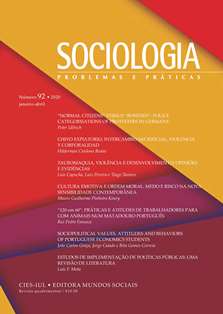“120 en 60”: pratiques et attitudes des ouvriers envers les animaux dans un abattoir portugais
DOI :
https://doi.org/10.7458/SPP20209218139Mots-clés :
pratiques, attitudes, individus, porcs, abattoirRésumé
Cette étude cherche à comprendre les pratiques et les attitudes des ouvriers chargés de l’abattage et de la découpe d’animaux dans un abattoir. Le travail d’observation a été complété par des photographies prises pendant l’acheminement, l’étourdissement, l’accrochage, la saignée et la découpe des animaux sur la ligne d’abattage, ainsi que par l’analyse qualitative à partir d’entretiens avec huit personnes: deux femmes et six hommes. Bien que les ouvriers reconnaissent les animaux comme des êtres sensibles, l’opérationnalisation de leurs tâches sur la ligne d’abattage passe par des stratégies qui requièrent une chosification et une distance émotionnelle. Le cadre de travail (abattoir), le temps passé, les tâches accomplies, l’espèce des animaux, mais surtout le sexe et les parcours socioculturels des salariés, sont autant de facteurs qui influencent fortement les pratiques et les attitudes observées.
Téléchargements
Publiée
Numéro
Rubrique
Licence
Authors who publish in this Journal must agree the following terms and conditions:
- Authors retain copyright and grant the Journal the right to first publication, while simultaneously agreeing to a Creative Commons Attribution License, which allows others to share their work on condition that they cite the original author(s) and recognise that the latter’s work was first published in this Journal.
- Authors are authorised to enter into additional contracts separately, for non-exclusive distribution of the version of the work that is published in this Journal (e.g. publication in an institutional repository or as a book chapter), subject to recognition of initial publication in this Journal.



